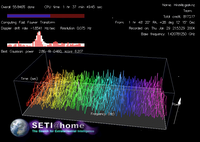SETI
There are some major questions in each of our lives, whether we explore these or not. The main one is probably who/what am I? And another is are we, as human beings, alone in the universe? It is interesting that very few schools spend much or any time on the first question, whether it is through conventional western style philosophy or more direct self-inquiry. And it is also interesting that only a minuscule amount of resources is spent on the second question, are we alone in the universe? No governments, as far as I know, allocate any money to SETI, and the private funding is very limited as well.
It is interesting that very few schools spend much or any time on the first question, whether it is through conventional western style philosophy or more direct self-inquiry. And it is also interesting that only a minuscule amount of resources is spent on the second question, are we alone in the universe? No governments, as far as I know, allocate any money to SETI, and the private funding is very limited as well.
I am not sure what that tells us about who we are at this stage in our evolution. Maybe that we are easily distracted. Maybe that for many of us, other issues appear more urgent. Maybe that our natural curiosity is out competed by other impulses or goes in other directions. Maybe that we have trouble peeling off the layers down to the really big questions. In any case, I have been fascinated by SETI since I first heard about it in my early teens, became a member of the Planetary Society a little later, and was among the first to sign up for SETI@home. Now, after a while of not running the SETI@home screen saver, it seems time to participate again.
In any case, I have been fascinated by SETI since I first heard about it in my early teens, became a member of the Planetary Society a little later, and was among the first to sign up for SETI@home. Now, after a while of not running the SETI@home screen saver, it seems time to participate again.
It is difficult to imagine any other discovery that will have a more significant impact on how we see ourselves, and eventually the course of our own evolution. Just knowing that we are not alone will be another nudge in our deprovinsialization of ourselves. And any exchange of real information, although it may take a long time before it gets going, will change our culture and evolution deeply.
Just the question itself, and contemplating the consequences of contact, or of not finding anything even after a thorough (still far into the future) search, is hugely important. The question and contemplation itself will change how we see ourselves.
Labels: astronomy, science, universe story